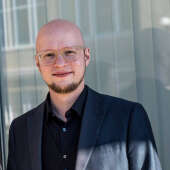Tuesday, December 4, 2018
Hojung Kim and Alex Tavares share their thoughts at Codefi’s November Meet the Member event
A physical device that teaches children with vision impairments how to read independently. A meal-sharing app that connects people within a city, inviting them into each other’s homes and to each other’s tables.
These are the ideas behind the two startups that took home $50,000 from the 2018 1st50K competition sponsored by Traverse Ventures, Codefi and the Cape Area Business Development Foundation.
The aim of the annual 1st50k startup competition is to help turn innovative ideas into scalable ventures. Winners receive a $50,000 grant, mentorship and office space at Codefi in Cape Girardeau, with all the member benefits of Codefi’s community.
This was the first year two startups were awarded a grant.
On Nov. 14, both winners — Alex Tavares, founder of T-var EdTech, and Hojung Kim, one of four founders of Homecooked — joined forces to introduce themselves to the Codefi community at the November Meet the Member event.
During the conversation, the two discussed their move to Cape Girardeau, being part of a team versus working alone, and the challenges they’ve faced as entrepreneurs and what they’re doing to overcome those.
Missed the chat? Don’t worry — here are some of the takeaways from the afternoon.
Takeaway #1: Use your own personal experiences to solve a problem.
Hojung Kim is 22 years old and recently moved to Cape Girardeau from Madison, Wisconsin, with the Homecooked creative director, Gabe Oviawe. With the Homecooked social dining mobile app that they and their two partners are developing, six to eight people can come together in a host’s home to have a meal. When signing up for an event, the app displays not only the menu and venue for the meal, but also short profiles of the host and other guests attending the event. If you have similar interests with someone attending, the app highlights this. It is, essentially, the AirBnb or Uber for dining experiences.
The idea, Kim says, stems from his own personal experience with loneliness and his belief that each generation is lonelier than the previous one, largely because of our digitalized society. Kim and his team want to harness technology for the reason it was intended: to help people connect.
“I was working with a social psychology professor at the University of Chicago during my college years, and we found that 47 percent of all meals in the U.S. were eaten alone,” Kim says. “We thought that was extremely sad because food for generations really came back to the way we socialize; it’s been the core of our society. So I started thinking about ways that we could start getting people eating together. That kind of started us out on this journey of Homecooked being a social platform.”
Alex Tavares’ startup, T-Var EdTech, was born from his academic interests. Originally from Rhode Island, Tavares has lived in Ohio for the past 10 years. With a background in teaching specifically as a reading instructor for 15 years, he was looking for a device that does what his own Read Read device does, but could never find one that lived up to its promises. So, The Read Read device was born, which uses tiles children interact with to learn how to read on their own. The device is designed specifically for students with visual impairments and blindness, as well as kids with autism and dyslexia.
“My background is in neuroscience and cognitive science, so [The Read Read] uses some of those best practice techniques that we know, those same things that allow us to make rats get addicted to cocaine,” Tavares jokes. “But this is a positive use of that technology.”
Takeaway #2: Make the elite accessible to the masses.
That’s what Homecooked is working to do. Kim and his partners found that pop-up dining supper clubs are often accessible only to people who can afford to pay $120 for a meal. At these experiences, the focus is on the food, not the people present. Homecooked wants to make pop-up meals like this available for as little as $10, so people can afford to do this multiple times each week.
“We’re thinking that food is just this way for people to connect,” Kim says. “The actual value is in meeting other people.”
Tavares, too, is working to bring best practice techniques to the children he hopes his Read Read device will serve. Although many people have tried to solve this problem unsuccessfully, Tavares believes assumptions about how people learn to read, which much of the money behind solutions to this problem has funded, must be abandoned for research-proven methods.
“So far, it’s all been money wasted because there are some fundamental assumptions there that you can learn to read using a screen-based app,” Tavares says. “So I’m taking a different approach, a physical approach that’s been implemented in some toys and whatnot, but again, using best practice techniques and technology to make it effective.”
Takeaway #3: Do the work yourself. (And also know when to ask for help from the experts.)
As a one-man team, Tavares has done much of the work for The Read Read device himself, creating the researched ideas, teaching himself the basics of electrical engineering and seeking funding for professional help. He says a benefit in working by himself is that he can work at his own pace and pore as much time as necessary into his startup, without asking for another person’s time or opinions. Still, he says it is important to know when it is time to go to the experts with a problem.
“My business card, if I had one, would say CEO and janitor,” Tavares says. “I’ve been that do-it-all-until-I-can’t-do-it-no-more kind of guy, which has its pluses and significant drawbacks. Taking something to the point where you’re ready to turn it over to a professional but you’ve had your hands on it long enough allows you to really speak at a deeper level with people.”
Takeaway #4: Think of entrepreneurship like a squash match.
It’s true: Kim was once a professional squash player. (Although he is sure to note that this is in the past-tense, stating he is much more out of shape now than he was then.) He says to be a professional athlete, the sport has to become your life. There is much dedication and sweat that goes into it.
Kind of like being an entrepreneur.
“I’d say the biggest commonality between my professional squash days and now is there’s a lot of instability,” Kim says. “You don’t really know what each day is going to bring. You have to get comfortable with the chaos. The other thing is that when you’re playing professionally, you have to really believe that you can go out there and you can play and beat top-100-level guys. You have to be kind of a mix of stupid and brave. And I think that really carries over to entrepreneurship. You’re starting out small, very few resources, and you’re trying to create something in the world that might not even have a place. So you have to believe it can be possible.”
Takeaway #5: Build a community to learn from.
Kim mentions that without his teammates who have their own specialized skillsets, Homecooked would probably not be possible. Both Kim and Tavares note that having a supportive community in Codefi has been one of the major benefits to winning the 1st50K competition.
“There’s strong community here; if I need someone to look over a specific software issue I’m having, the resources are here. It’s really easy to do all that,” Tavares says. “I like this kind of fit. I worked in Boston where it’s really hard to get in contact with people. They might have a top talent pool, but it’s inaccessible to people. Here, everyone’s really friendly and accessible. I like to see that. I fit into that scene more.”
Kim agrees.
“Having a community where everybody’s working towards innovating, it’s definitely valuable,” he says of Codefi. “Having that all centralized creates that.”
Want to get in on Codefi Meet the Member events firsthand? Members of Codefi have access to benefits like this and more. Learn about it at codefiworks.com.




























